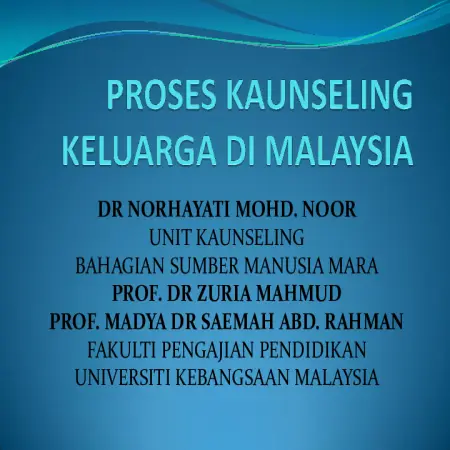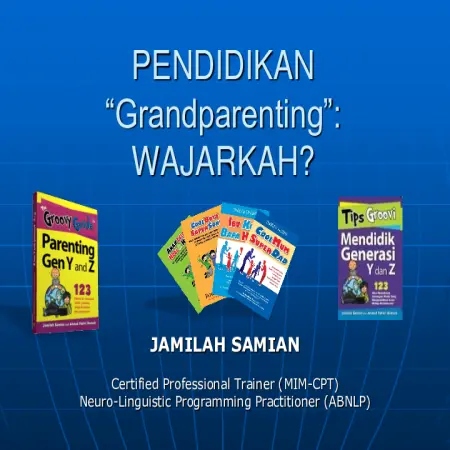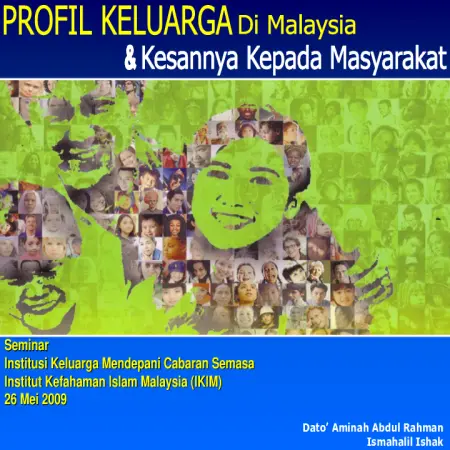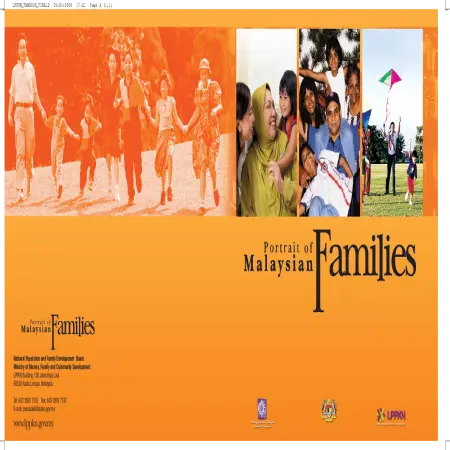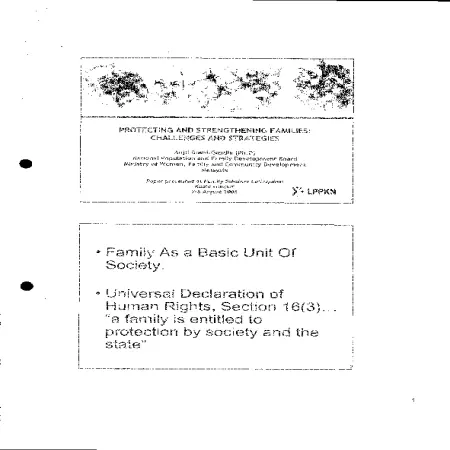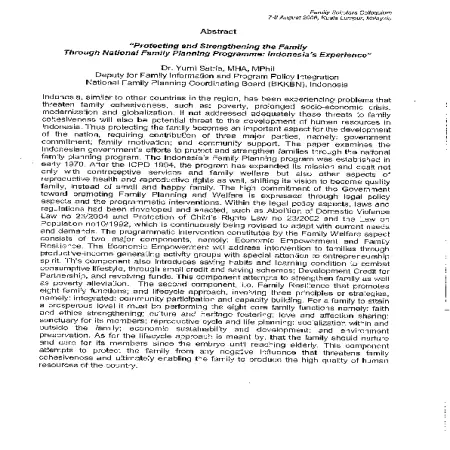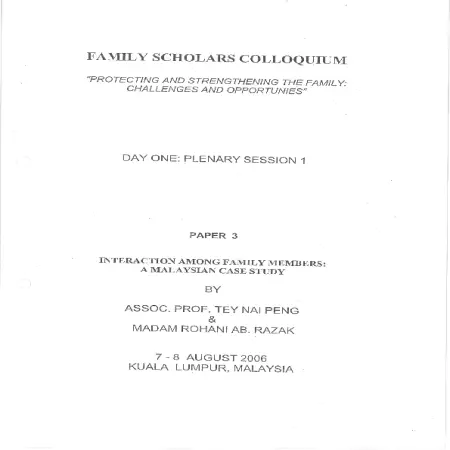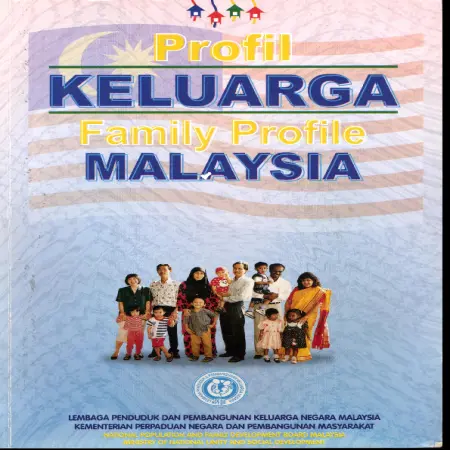TOPICS
Results for Topics : "Family"
|
|
Proses kaunseling keluarga di Malaysia
Item Type: Conference or Workshop Item
Editor:
Year: 00/00/2012
Abstract: Family counseling is one of the interventions in family services for built a healthy family in Malaysia. This is a qualitative case study of a variety of 'settings' aims to explore the phenomenon of family counseling process conducted by practitioners in Malaysia with an in-depth interview technique, observation and document analysis. Study participants in the study were 12 family counseling practitioners from three counseling service centers. This study has five research questions namely to (i) identify the type of cases handled, number of cases and causes of problems in the family counseling process (ii) identify the initial relationship in the family counseling process (iii) explore the family counseling process (iv) identify approaches and skills used in family counseling and (v) explore the impetus and challenges of the family counseling process among family counseling practitioners in various settings in Malaysia. Cross -case analysis method based on interviews, observations and document analysis on family counseling practitioners was implemented using Nvivo 8 software. In this study, 190 themes and sub -themes were produced from 12 study participants. The results show that there are some similarities and differences between the family counseling process in Malaysia and the process framework in Western countries. These similarities and differences occur at all levels of the counseling process, skills, use of techniques, application of theory, and challenges in practice. The results of the study also show that the family counseling process among practitioners in Malaysia is tied to the education and training received by the practitioner, the context of religion, culture, values and SES of the family and community in Malaysia. Therefore, this study contributes to the provision of family counseling process that is very necessary in strengthening the family institution and can be an intervention in building a generation of excellent Malaysian society.
|
|
|
|
|
|
Pengkelasan keberkesanan perancang keluarga menggunakan pepohon keputusan
Item Type: Conference or Workshop Item
Editor:
Year: 00/00/2012
Abstract: Awareness of the importance of family planning practices for a family institution in Malaysia began around the 1960s. In order to plan family size it is important to determine the appropriate and effective method of family planning. Therefore, this study was conducted to develop a best classification model and identify the factors of effectiveness of such methods and also for women who do not use any family planning method, factors that influence the effectiveness of non-use of methods are also identified. Classification techniques in data mining were used to obtain patterns of effectiveness of the family planning methods used. The classification techniques used are result trees J48, ID3, Random Tree, REPTree and Bayes classifier Naive Bayes. Secondary data from the fourth set of the Malaysian Population and Family Survey (MPFS) obtained from the National Population and Family Development Board (LPPKN) were used in this study. To obtain the best classification model, 10-fold cross validation method, Weka and Mynda applications were used. The test results found that the J48 result tree was selected as the best classification model because this model provides the highest accuracy values for both data sets of 87.83% and 80.42% compared to other techniques. The study has produced a decision tree that can generate a set of tips to identify the effectiveness of family planning methods used and a set of tips to identify the effectiveness of those who do not use family planning methods. In conclusion, this study does not cover women who are using family planning methods and it is hoped that future studies will cover the effectiveness of the method for women who are using family planning methods and make pattern comparisons based on MPFS 1, MPFS 2, MPFS 3 and MPFS 4 data sets.
|
|
|
|
|
|
Profil keluarga di Malaysia & kesannya kepada masyarakat
Item Type: Conference or Workshop Item
Editor:
Year: 00/00/2009
Abstract: Family institution in Malaysia is facing many changes and challenges. Functional families and the role of institutions is crucial to the development of human capital formation, human and potential development of each family members and influence the development and well-being of the people. Formation patterns and family relationships as well as family lifestyle can be seen in the demographic trends in Malaysia. Formation and family structure that encountered evolution has influenced some aspects of family life. Now family institutions are required to be more resilient in dealing with the challenges of life such as child care, dual-career couples, financial management, parenting teens and responsibilities to elderly parents.
|
|
|
|
|
|
Penduduk dan keluarga: penemuan Kajian Penduduk dan Keluarga Keempat
Item Type: Conference or Workshop Item
Editor:
Year: 00/00/2009
Abstract: This paper discusses the important findings of the Fourth Population and Family Survey conducted by NPFDB in 2004. This study is the fourth in a series of Malaysian Population and Family Survey (MPFS) conducted every ten years since 1974. In 2004, this study was for the first time conducted simultaneously for the whole of Malaysia. In contrast to the previous MPFS, MPFS-4 interviewed households consisting of five (5) categories, (a) Women aged 15 to 49 years, (b) Husbands of married women, (c) Adolescents aged 13 to 24 years, (d) Citizens aged 50 years and above, and (e) single residents aged 25 to 49 years. This study aims to provide time series data related to demographic and socio-economic information in particular the relationship between population, family and human reproduction with development. The results of the study are used to evaluate the effectiveness of existing development programs and also used as input in the preparation of the Ninth Malaysia Plan (9MP). In this study data analysis was performed for the three areas separately. Among the important findings include: 1) Age structure of the population, 2) burden of dependents, 3) Delayed marriages, 4) Fertility, 5) Family planning, 6) Health practices, 7) Household composition, 8) Female labor force participation, 9) Child care, 10) The elderly, and 11) Adolescent social and sexual behavior.
|
|
|
|
|
|
Protecting and strengthening families: challenges and strategies - Malaysian perspective
Item Type: Conference or Workshop Item
Editor:
Year: 00/00/2006
Abstract: Over the past decade rapid transitions in Malaysian family structure and family life have occurred due to globalization, industrialization and socio-economic development. Education, economic activities, infusion of cultures, religion, migration, urbanization plus improvements in living standards all tend to have an impact on families and loosen the traditional structure. Some of the key changes that have reshaped Malaysian families include a smaller family size due to declining birth rate, increase in nuclear families, rise in marital break-up and single parent households and increased participation of women in the labour force by women. The traditional picture of a male breadwinner and female homemaker characterizes a smaller proportion of Malaysian families today. This paper focuses on the profile, issues and challenges confronting Malaysian Families, marriage, family relationships, need for balancing work and family life, role of father and impact of technology on the family. The role of the family in Malaysia is very crucial as the development of the human potential is a key component of the nine challenges as promulgated in Vision 2020. Various promotive, preventive and advocacy programmes and activities have been initiatives undertaken together with NG0s, the private and public sector as well as education and training institutions to ensure the strengthening of the family unit as well as helping families cope with the demands of contemporary living.
|
|
|
|
|
|
Protecting and strengthening the family through National Family Planning Programme: Indonesia's experience
Item Type: Conference or Workshop Item
Editor:
Year: 00/00/2006
Abstract: Indonesia, similar to other countries in the region, has been experiencing problems that threaten family cohesiveness, such as: poverty, prolonged socio-economic crisis, modernization and globalization. If not addressed adequately these threats to family cohesiveness will also be potential threat to the development of human resources in Indonesia. Thus protecting the family becomes an important aspects for the development of the nation, requiring contribution of three major parties, namely: government commitment; family motivation; and community support. The paper examines the Indonesian government's efforts to protect and strengthen families through the national family planning program. The Indonesia's family Planning program was established in early 1970. After the ICPD 1994, the program has expanded its mission and dealt not only with contraceptive services and family welfare but also other aspects of reproductive health and reproductive rights as well, shifting its vision to become quality family, instead of small and happy family. High commitment of the Government towards promoting Family Planning and Welfare is expressed through legal policy aspects and the programmatic interventions.
|
|
|
|
|
|
Protecting and strengthening the family: challenges and opportunies
Item Type: Conference or Workshop Item
Editor:
Year: 00/00/2006
Abstract: Findings from the Malaysian Population and Family Survey 2004. Perceptions of relationships among family members found that as many as 98.5% of women said they had good family relationships comprising 99% Malays, 98% Chinese and 95% Indians. A total of 99% of men also stated that they have good family relationships, namely 99.2% Malays, 98.0% Chinese and 98.2% Indians. Meanwhile, 99.3% of women who did not have financial problems stated that they had good family relationships compared to 98.3% who had financial problems.
|
|
|
|
|
|
Profil keluarga/Family profile Malaysia
Item Type: Research Report
Editor:
Year: 00/00/1999
Abstract: The book on Family Profile: Findings of studies contains information from studies done by NPFDB namely Population and Family Survey,1984 and 1994, The socio-Economic effects of population Ageing in Malaysia,1986, Malaysian Family life Survey 1988, Sub-National District population Survey (Kajian Penduduk Daerah) 1992. A survey on the Effects of Socio-Economic Development on Family and Gender Relations in Kuala Lumpur,1995, Adolescents Social Behaviour in Malaysia 1994/95, Adolescents Social Behaviour 1993 and Terengganu, 1995 and Adolescents Reproductive Health and Sexual Behaviour in Malaysia, 1994/95.The findings of these studies have been analysed and arranged according to the changing patterns and trends that have occurred to families since 1986. Some of these studies are representative of Peninsular Malaysia while others are confined only to certain areas of the Peninsular. Nevertheless, the description of situations derived from these findings are consistent and reliable.
|
|
|
|





